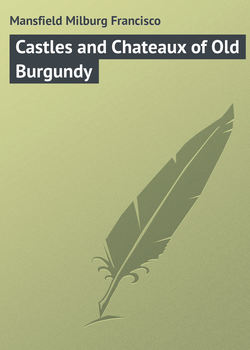Castles and Chateaux of Old Burgundy

Реклама. ООО «ЛитРес», ИНН: 7719571260.
Оглавление
Mansfield Milburg Francisco. Castles and Chateaux of Old Burgundy
CHAPTER I. THE REALM OF THE BURGUNDIANS
CHAPTER II. IN THE VALLEY OF THE YONNE
CHAPTER III. AVALLON, VEZELAY AND CHASTELLUX
CHAPTER IV. SEMUR-EN-AUXOIS, ÉPOISSES AND BOURBILLY
CHAPTER V. MONTBARD AND BUSSY-RABUTIN
CHAPTER VI “CHASTILLON AU NOBLE DUC” (The War Cry of the Bourguignons)
CHAPTER VII. TONNERRE, TANLAY AND ANCY-LE-FRANC
CHAPTER VIII. IN OLD BURGUNDY
CHAPTER IX. DIJON, THE CITY OF THE DUKES
CHAPTER X. IN THE CÔTE D’OR: BEAUNE, LAROCHEPOT AND ÉPINAC
CHAPTER XI. MÂCON, CLUNY AND THE CHAROLLAIS
CHAPTER XII. IN THE BEAUJOLAIS AND LYONNAIS
CHAPTER XIII. THE FRANCHE COMTÉ: AUXONNE AND BESANÇON
CHAPTER XIV. THE SWISS BORDER: BUGEY AND BRESSE
CHAPTER XV. GRENOBLE AND VIZILLE: THE CAPITAL OF THE DAUPHINS
CHAPTER XVI. CHAMBÉRY AND THE LAC DU BOURGET
CHAPTER XVII. IN THE SHADOW OF LA GRANDE CHARTREUSE
CHAPTER XVIII. ANNECY AND LAC LEMAN
CHAPTER XIX. THE MOUNTAIN BACKGROUND OF SAVOY
CHAPTER XX. BY THE BANKS OF THE RHÔNE
CHAPTER XXI. IN THE ALPS OF DAUPHINY
CHAPTER XXII. IN LOWER DAUPHINY
Отрывок из книги
THERE is no more charming river valley in all France than that of the Yonne, which wanders from mid-Burgundy down to join the Seine just above Fontainebleau and the artists’ haunts of Moret and Montigny.
The present day Département of the Yonne was carved out of a part of the old Senonais and Auxerrois; the latter, a Burgundian fief, and the former, a tiny countship under the suzerainty of the Counts of Champagne. Manners and customs, and art and architecture, however, throughout the department favour Burgundy in the south rather than the northern influences which radiated from the Ile de France. This is true not only with respect to ecclesiastical, civic and military architecture, but doubly so with the domestic varieties ranging from the humble cottage to the more ambitious manoirs and gentilshommeries, and finally, to the still more magnificent seigneurial chateaux. Within the confines of this area are some of the most splendid examples extant of Burgundian domestic architecture of the Renaissance period.
.....
Mlle. de Montpensier – “la Grande Mademoiselle” – was chatelaine of Saint Fargeau in the mid-seventeenth century. Her comings and goings, to and from Paris, were ever written down at length in court chronicles and many were the “incidents” – to give them a mild definition – which happened here in the valley of the Yonne which made good reading. On one occasion when Mademoiselle quitted Paris for Saint Fargeau she came in a modest “carosse sans armes.” It was for a fact a sort of sub-rosa sortie, but the historian was discreet on this occasion. Travel in the old days had not a little of romanticism about it, but for a lady of quality to travel thus was, at the time, a thing unheard of. This princess of blood royal thus, for once in her life, travelled like a plebeian.
Closely bound up with the Sennonais were the fiefs of Auxerre and Tonnerre, whose capitals are to-day of that class of important provincial cities of the third rank which play so great a part in the economic affairs of modern France. But their present commercial status should by no means discount their historic pasts, nor their charm for the lover of old monuments, since evidences remain at every street corner to remind one that their origin was in the days when knights were bold. The railway has since come, followed by electric lights and automobiles, all of which are once and again found in curious juxtaposition with a bit of mediæval or Renaissance architecture, in a manner that is surprising if not shocking. Regardless of the apparent modernity roundabout, however, there is still enough of the glamour of mediævalism left to subdue the garishness of twentieth century innovations. All this makes the charm of French travel, – this unlocked for combination of the new and the old that one so often meets. One can not find just this same sort of thing at Paris, nor on the Riviera, nor anywhere, in fact, except in these minor capitals of the old French provinces.
.....